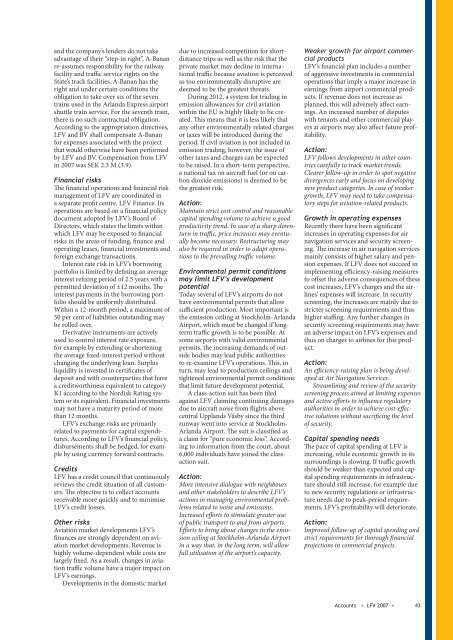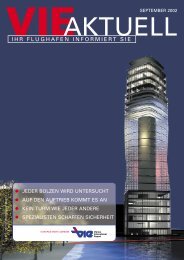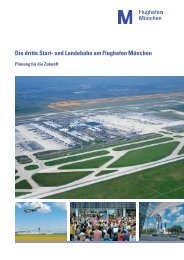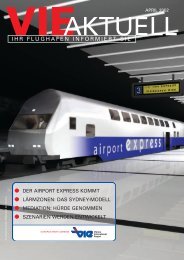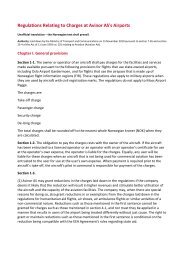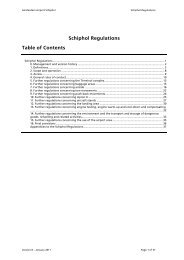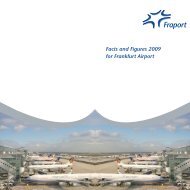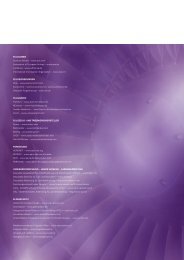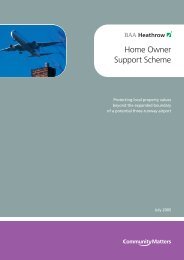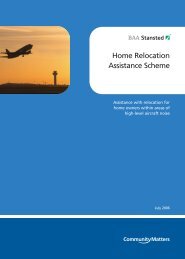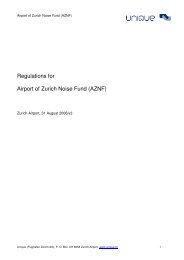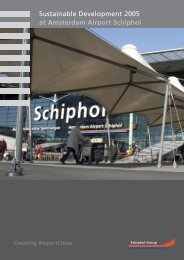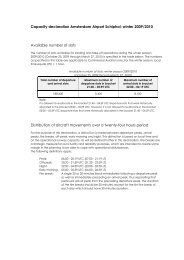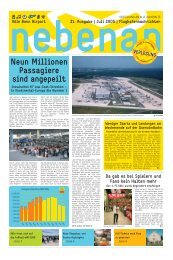The LFV Group - Airport Mediation - Home
The LFV Group - Airport Mediation - Home
The LFV Group - Airport Mediation - Home
- No tags were found...
Create successful ePaper yourself
Turn your PDF publications into a flip-book with our unique Google optimized e-Paper software.
and the company’s lenders do not takeadvantage of their “step-in right”, A-Bananre-assumes responsibility for the railwayfacility and traffic service rights on theState’s track facilities. A-Banan has theright and under certain conditions theobligation to take over six of the seventrains used in the Arlanda Express airportshuttle train service. For the seventh train,there is no such contractual obligation.According to the appropriation directives,<strong>LFV</strong> and BV shall compensate A-Bananfor expenses associated with the projectthat would otherwise have been performedby <strong>LFV</strong> and BV. Compensation from <strong>LFV</strong>in 2007 was SEK 2.3 M (3.9).Financial risks<strong>The</strong> financial operations and financial riskmanagement of <strong>LFV</strong> are coordinated ina separate profit centre, <strong>LFV</strong> Finance. Itsoperations are based on a financial policydocument adopted by <strong>LFV</strong>’s Board ofDirectors, which states the limits withinwhich <strong>LFV</strong> may be exposed to financialrisks in the areas of funding, finance andoperating leases, financial investments andforeign exchange transactions.Interest rate risk in <strong>LFV</strong>’s borrowingportfolio is limited by defining an averageinterest refixing period of 2.5 years with apermitted deviation of ±12 months. <strong>The</strong>interest payments in the borrowing portfolioshould be uniformly distributed.Within a 12-month period, a maximum of50 per cent of liabilities outstanding maybe rolled over.Derivative instruments are activelyused to control interest rate exposure,for example by extending or shorteningthe average fixed-interest period withoutchanging the underlying loan. Surplusliquidity is invested in certificates ofdeposit and with counterparties that havea creditworthiness equivalent to categoryK1 according to the Nordisk Rating systemor its equivalent. Financial investmentsmay not have a maturity period of morethan 12 months.<strong>LFV</strong>’s exchange risks are primarilyrelated to payments for capital expenditures.According to <strong>LFV</strong>’s financial policy,disbursements shall be hedged, for exampleby using currency forward contracts.Credits<strong>LFV</strong> has a credit council that continuouslyreviews the credit situation of all customers.<strong>The</strong> objective is to collect accountsreceivable more quickly and to minimise<strong>LFV</strong>’s credit losses.Other risksAviation market developments <strong>LFV</strong>’sfinances are strongly dependent on aviationmarket developments. Revenue ishighly volume-dependent while costs arelargely fixed. As a result, changes in aviationtraffic volume have a major impact on<strong>LFV</strong>’s earnings.Developments in the domestic marketdue to increased competition for shortdistancetrips as well as the risk that theprivate market may decline in internationaltraffic because aviation is perceivedas too environmentally disruptive aredeemed to be the greatest threats.During 2012, a system for trading inemission allowances for civil aviationwithin the EU is highly likely to be created.This means that it is less likely thatany other environmentally related chargesor taxes will be introduced during theperiod. If civil aviation is not included inemission trading, however, the issue ofother taxes and charges can be expectedto be raised. In a short-term perspective,a national tax on aircraft fuel (or on carbondioxide emissions) is deemed to bethe greatest risk.Action:Maintain strict cost control and reasonablecapital spending volume to achieve a goodproductivity trend. In case of a sharp downturnin traffic, price increases may eventuallybecome necessary. Restructuring mayalso be required in order to adapt operationsto the prevailing traffic volume.Environmental permit conditionsmay limit <strong>LFV</strong>’s developmentpotentialToday several of <strong>LFV</strong>’s airports do nothave environmental permits that allowsufficient production. Most important isthe emission ceiling at Stockholm-Arlanda<strong>Airport</strong>, which must be changed if longtermtraffic growth is to be possible. Atsome airports with valid environmentalpermits, the increasing demands of outsidebodies may lead public authoritiesto re-examine <strong>LFV</strong>’s operations. This, inturn, may lead to production ceilings andtightened environmental permit conditionsthat limit future development potential.A class-action suit has been filedagainst <strong>LFV</strong> claiming continuing damagesdue to aircraft noise from flights abovecentral Upplands Väsby since the thirdrunway went into service at Stockholm-Arlanda <strong>Airport</strong>. <strong>The</strong> suit is classified asa claim for “pure economic loss”. Accordingto information from the court, about6,000 individuals have joined the classactionsuit.Action:More intensive dialogue with neighboursand other stakeholders to describe <strong>LFV</strong>’sactions in managing environmental problemsrelated to noise and emissions.Increased efforts to stimulate greater useof public transport to and from airports.Efforts to bring about changes in the emissionceiling at Stockholm-Arlanda <strong>Airport</strong>in a way that, in the long term, will allowfull utilisation of the airport’s capacity.Weaker growth for airport commercialproducts<strong>LFV</strong>’s financial plan includes a numberof aggressive investments in commercialoperations that imply a major increase inearnings from airport commercial products.If revenue does not increase asplanned, this will adversely affect earnings.An increased number of disputeswith tenants and other commercial playersat airports may also affect future profitability.Action:<strong>LFV</strong> follows developments in other countriescarefully to track market trends.Clearer follow-up in order to spot negativedivergences early and focus on developingnew product categories. In case of weakergrowth, <strong>LFV</strong> may need to take compensatorysteps for aviation-related products.Growth in operating expensesRecently there have been significantincreases in operating expenses for airnavigation services and security screening.<strong>The</strong> increase in air navigation servicesmainly consists of higher salary and pensionexpenses. If <strong>LFV</strong> does not succeed inimplementing efficiency-raising measuresto offset the adverse consequences of thesecost increases, <strong>LFV</strong>’s charges and the airlines’expenses will increase. In securityscreening, the increases are mainly due tostricter screening requirements and thushigher staffing. Any further changes insecurity screening requirements may havean adverse impact on <strong>LFV</strong>’s expenses andthus on charges to airlines for this product.Action:An efficiency-raising plan is being developedat Air Navigation Services.Streamlining and review of the securityscreening process aimed at limiting expensesand active efforts to influence regulatoryauthorities in order to achieve cost-effectivesolutions without sacrificing the levelof security.Capital spending needs<strong>The</strong> pace of capital spending at <strong>LFV</strong> isincreasing, while economic growth in itssurroundings is slowing. If traffic growthshould be weaker than expected and capitalspending requirements in infrastructureshould still increase, for example dueto new security regulations or infrastructureneeds due to peak-period requirements,<strong>LFV</strong>’s profitability will deteriorate.Action:Improved follow-up of capital spending andstrict requirements for thorough financialprojections in commercial projects.Accounts > <strong>LFV</strong> 2007


